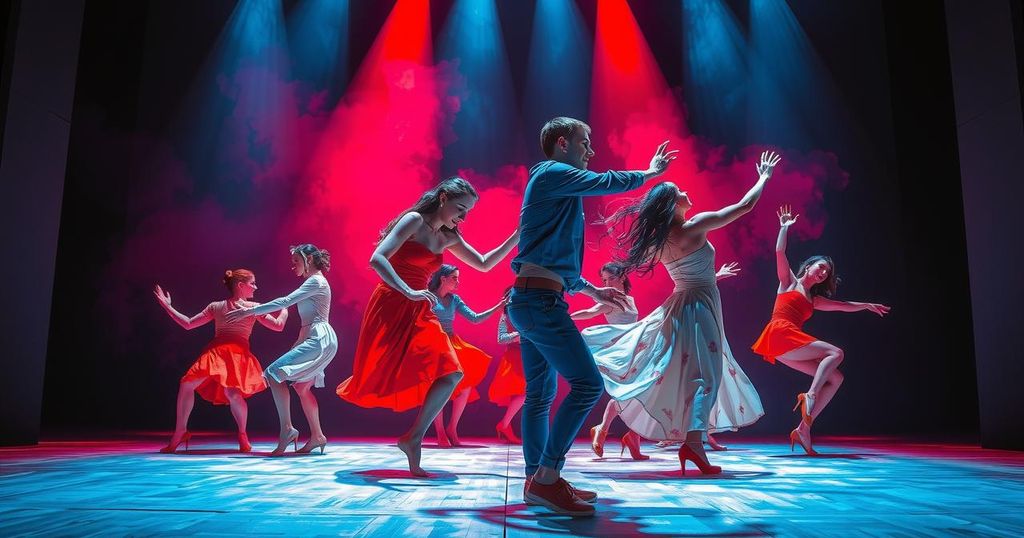Lebanon’s Theatres Reopen Amidst Echoes of War, Telling Stories of Resilience
Lebanon’s theatre scene is slowly reviving after last year’s war, with productions like Ali Chahrour’s “When I Saw the Sea” and Fatima Bazzi’s “Suffocated” focusing on migrant workers’ struggles and personal experiences from the conflict, respectively. Despite economic challenges, artists like Omar Abi Azar remain hopeful as they share vital narratives from their shared history.
In the backdrop of a year marked by war, Lebanon’s theatrical scene is attempting a comeback. Playwright Ali Chahrour is at the forefront, unveiling a performance that highlights the struggles of migrant workers affected by the conflict. His work, which premiered in Beirut earlier this month, draws inspiration from the harsh realities of the two-month war between Israel and the Lebanese militant group Hezbollah, which officially ceased in November.
Chahrour’s play, titled “When I Saw the Sea,” showcases two Ethiopian domestic workers and a Lebanese woman of Ethiopian descent who share stories of exile through spoken word, song, and dance. “This project was born during the war,” Chahrour explained. He added, “I did not want to stop making theatre, because I don’t know how to fight or carry weapons; I only know how to dance.”
The narrative pays homage to the migrant women who were either killed or displaced during the conflict, highlighting the plight of these workers. Many sought refuge in shelters run by non-governmental organizations after employers fled the escalating violence, leaving them homeless on the streets of a beleaguered Beirut.
Another figure emerging from this cultural renaissance is playwright Fatima Bazzi, who presented her piece, “Suffocated,” in May as well. This work, influenced by her own displacement from her home in Beirut’s southern suburbs, now mirrors her personal experiences during the war. Originally focused on themes of domestic strife, Bazzi reshaped it after her escape to Iraq amid the fighting.
Bazzi maintained regular contact with her cast through video calls, eager to continue the collaborative process despite the circumstances. She recounted how they incorporated elements of separation into the performance. At a crucial moment in the play, a bomb’s sound interrupts the characters, prompting them to check for updates on what had been struck, which reflects their own experiences.
“Working on the play has allowed us to express the feelings we endured, acting as both escape and therapy for the cast and myself,” Bazzi remarked.
While Beirut’s theatres remained silent throughout the conflict, they are now reopening, albeit amid a daunting economic crisis that has persisted since 2019. Omar Abi Azar, the 41-year-old founder of the Zoukak collective, shared how his organization had to postpone an entire festival due to the war, yet he remains optimistic about the sector’s recovery. “Now we have started to pick up the pace again,” said Abi Azar, who also has a play entitled “Stop Calling Beirut” that delves into his childhood memories of loss during Lebanon’s civil war.
Zoukak originated during a previous conflict between Hezbollah and Israel back in 2006, solidifying its connection to Lebanon’s tumultuous history. “We are children of war. We were born, raised and grew up in the heart of these crises,” he reflected, emphasizing that for him, the reality of living through such turmoil is not a hindrance but an intrinsic part of their identities as artists. “If this reality wanted to pull us down, it would have dragged us, buried us and killed us a long time ago,” he said, projecting hope through the medium of art.
Lebanon’s theatre community is attempting to rise from the shadows cast by war with impactful productions that reflect on the hardships of the recent conflict. Chahrour and Bazzi, along with others, are using their talents to tell stories of suffering, resilience, and the unique narratives of migrant workers. Despite the ongoing economic challenges, the desire for artistic expression remains strong—a testament to the enduring spirit of those connected to Lebanon’s tumultuous history.
Original Source: www.france24.com




Post Comment